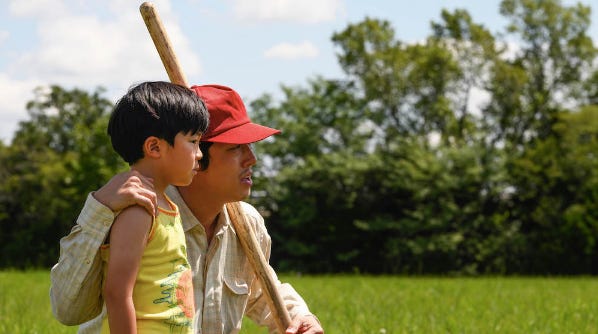Minari
While it fails to meet the high expectations set from its acclaim at Sundance, A24's newest film "Minari" still manages to connect with audiences because of its intimate realism and unflinching truth.
I try to avoid coming into a movie with expectations already but sometimes it’s difficult to avoid.
A24 has had a track record of putting out excellent films as a studio, including its Best Picture winner “Moonlight.” Every year, several of this studio’s films make my list for favorite movies released with hits such as “Ex Machina,” “Lady Bird,” “Midsommar,” “Room,” “The Lighthouse,” “The Witch,” “Eighth Grade,” “The Farewell” and “Uncut Gems.”
So when there was a big awards season push for “Minari” — A24’s newest release and a big winner at the Sundance Film Festival a year ago — it raised expectations pretty high for me. And even though I had not seen the film, I wasn’t surprised to see the movie turn up on numerous “best of” lists for 2020, including scoring the top prize from many critics associations.
(Side note: it’s interesting that “Minari” isn’t A24’s only agricultural themed movie with an Asian lead after 2020’s release “First Cow.”)
Now that I’ve seen “Minari” (now available in theaters and available on streaming rental on Feb. 26) I can say that it’s a very good film, but not a great one.
There are definitely five or six movies released in 2020 that I believe are far superior. I have to wonder if my opinion is affected by high expectations. I didn’t read any interviews or reviews prior to watching my screener but it was hard to avoid seeing the film’s name again and again among “best of” lists.
I don’t think it’s that controversial that “Minari” didn’t score any Golden Globe nominations. It’s an enjoyable portrait of American life from a different perspective but I’m not sure it shatters the Earth in any real way.
To be clear: my disappointment should read as harsh criticism. This is still a very good film.
Isaac Lee Chung’s directorial effort is more than solid. It’s expertly paced with intimate realism. The semi-autobiographical story about a Korean family attempting to start a farm in Arkansas in the 1980s is a true American story and one that isn’t always told. And I’m sure that many people will say that this film is true to their own experiences. In fact, I’d say that there isn’t a false note in this movie.
The Golden Globes categorized this as a “foreign language film” since Korean is used through most of the movie but the film is made in America and is truly a story of immigrants chasing their American dream. They might be speaking another language but it’s an American film.
Steven Yeun (of “Walking Dead” fame) gives an acclaimed performance as the strict and reserved father but his performance is almost too subtle. The screenplay never really explains why this patriarch yearns to be a farmer and puts his crop produce ahead of his family unity. It hints at it but never explores his motivations and emotional origins.
I can’t blame Yeun for his performance failing to soar because the role needed more development. While movie critics have praised Yeun and predicted Oscar nominations, I just don’t see it. He’s serviceable and solid but nothing amazing.
His wife and mother-in-law, played by Han Ye-ri and Youn Yuh-Jung, respectively, are much more interesting characters and his adorable children made me chuckle at times.
To me, the heart of the movie is the relationship between the grandmother and the son. There are are some really sweet moments between the two, such as the grandmother teasing the boy for wetting the bed and the boy responding that she’s “not a real grandmother” because she doesn’t bake cookies and sits around watching wrestling on VHS tapes instead.
“Minari” is an incredibly likable film. It’s sunny and light and accessible (especially by A24 standards) so I can see why critics are fawning over this “nice little movie.” The agriculture metaphors in this film (about planting roots) are obvious, especially when telling a story about immigrant assimilation and pursuing the American dream, but they still work.
To continue the farmer analogies, I guess this movie has planted some seeds but maybe I hoped that something more substantial would have been harvested.





